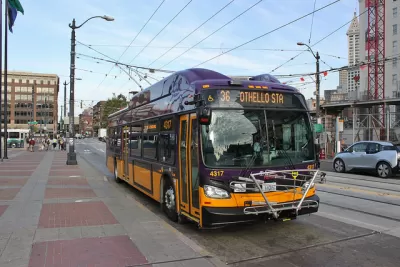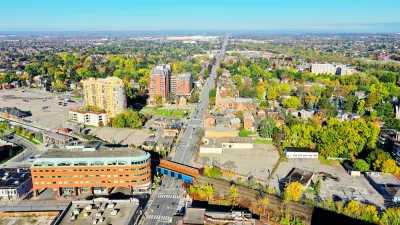Transit malls and voter support have buoyed a system that continues to attract commuters and other riders.

Seattle's buses are gaining riders. This is remarkable, in part, because the rest of the country is generally losing public transit riders and bus riders in particular. This matters for reasons of environmentalism and equality. "Bus service is crucial to reducing emissions in the Seattle region. According to King County Metro, which serves the region. Nearly half of all greenhouse gas emissions in Washington State come from transportation," Andrew Small reports for CityLab. In terms of equity, the larger the population that rides the bus, the more likely the buses are to gain support, so that it's not just those who can't afford to drive or are physically unable to do so, who fight for these resources.
Small doesn't point to any one silver bullet to account for Seattle's growth in transit riders but, rather, three categories of fixes: the existence of transit malls, a handful of small fixes (like bus-only turn lanes in particular stretches), and the support of Seattle voters.
FULL STORY: How Seattle Bucked a National Trend and Got More People to Ride the Bus

Planetizen Federal Action Tracker
A weekly monitor of how Trump’s orders and actions are impacting planners and planning in America.

Maui's Vacation Rental Debate Turns Ugly
Verbal attacks, misinformation campaigns and fistfights plague a high-stakes debate to convert thousands of vacation rentals into long-term housing.

San Francisco Suspends Traffic Calming Amidst Record Deaths
Citing “a challenging fiscal landscape,” the city will cease the program on the heels of 42 traffic deaths, including 24 pedestrians.

Defunct Pittsburgh Power Plant to Become Residential Tower
A decommissioned steam heat plant will be redeveloped into almost 100 affordable housing units.

Trump Prompts Restructuring of Transportation Research Board in “Unprecedented Overreach”
The TRB has eliminated more than half of its committees including those focused on climate, equity, and cities.

Amtrak Rolls Out New Orleans to Alabama “Mardi Gras” Train
The new service will operate morning and evening departures between Mobile and New Orleans.
Urban Design for Planners 1: Software Tools
This six-course series explores essential urban design concepts using open source software and equips planners with the tools they need to participate fully in the urban design process.
Planning for Universal Design
Learn the tools for implementing Universal Design in planning regulations.
Heyer Gruel & Associates PA
JM Goldson LLC
Custer County Colorado
City of Camden Redevelopment Agency
City of Astoria
Transportation Research & Education Center (TREC) at Portland State University
Jefferson Parish Government
Camden Redevelopment Agency
City of Claremont





























